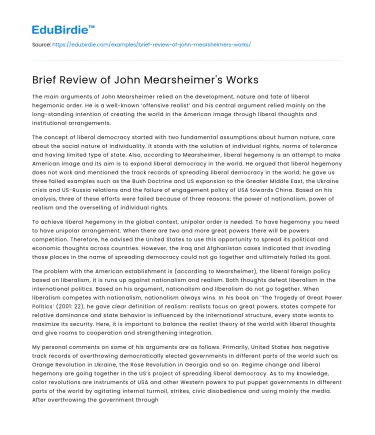The main arguments of John Mearsheimer relied on the development, nature and fate of liberal hegemonic order. He is a well-known ‘offensive realist’ and his central argument relied mainly on the long-standing intention of creating the world in the American image through liberal thoughts and institutional arrangements.
The concept of liberal democracy started with two fundamental assumptions about human nature, care about the social nature of individuality. It stands with the solution of individual rights, norms of tolerance and having limited type of state. Also, according to Mearsheimer, liberal hegemony is an attempt to make American image and its aim is to expand liberal democracy in the world. He argued that liberal hegemony does not work and mentioned the track records of spreading liberal democracy in the world; he gave us three failed examples such as the Bush Doctrine and US expansion to the Greater Middle East, the Ukraine crisis and US-Russia relations and the failure of engagement policy of USA towards China. Based on his analysis, three of these efforts were failed because of three reasons; the power of nationalism, power of realism and the overselling of individual rights.
Save your time!
We can take care of your essay
- Proper editing and formatting
- Free revision, title page, and bibliography
- Flexible prices and money-back guarantee
To achieve liberal hegemony in the global context, unipolar order is needed. To have hegemony you need to have unipolar arrangement. When there are two and more great powers there will be powers competition. Therefore, he advised the United States to use this opportunity to spread its political and economic thoughts across countries. However, the Iraq and Afghanistan cases indicated that invading those places in the name of spreading democracy could not go together and ultimately failed its goal.
The problem with the American establishment is (according to Mearsheimer), the liberal foreign policy based on liberalism, it is runs up against nationalism and realism. Both thoughts defeat liberalism in the international politics. Based on his argument, nationalism and liberalism do not go together. When liberalism competes with nationalism, nationalism always wins. In his book on ‘The Tragedy of Great Power Politics’ (2001: 22), he gave clear definition of realism: realists focus on great powers, states compete for relative dominance and state behavior is influenced by the international structure, every state wants to maximize its security. Here, it is important to balance the realist theory of the world with liberal thoughts and give rooms to cooperation and strengthening integration.
My personal comments on some of his arguments are as follows. Primarily, United States has negative track records of overthrowing democratically elected governments in different parts of the world such as Orange Revolution in Ukraine, the Rose Revolution in Georgia and so on. Regime change and liberal hegemony are going together in the US’s project of spreading liberal democracy. As to my knowledge, color revolutions are instruments of USA and other Western powers to put puppet governments in different parts of the world by agitating internal turmoil, strikes, civic disobedience and using mainly the media. After overthrowing the government through color revolution, it paved the way for American companies to exploit its resources and spread its political ideology in to that country. Therefore, America in the name of spreading democracy has interest of economic exploitation which he did not mention it clearly. Also, it is difficult to conclude that USA has no moral ground to defend itself as forerunner of democracy and human rights. Also, it is certain that people across the globe need basic human rights. Democracy has different interpretations in different parts of the world. Some countries look it as a goal and some look it as a means to achieve certain goals such as realizing economic growth and delivering public goods. Various countries have their own historical, cultural and many other features and citizen’s interests. Therefore, there is no straight jacket of thought concerning the liberal democratic thoughts in the world.
Secondly, Mearsheimer mentioned that liberal democracies do not fight each other and they are peace loving is controversial. Can we say that liberal countries are peace loving countries? As we know, countries during World War II and the Cold War periods went to war and certain degree of antagonism with similar political ideological thoughts. Therefore, the theory of presenting all liberal countries as peace loving does not have historical justifications.
According to Mearsheimer, currently United States is facing two challenges that prevent to spread liberal democracy in the world; the coming of Donald Trump and the rise of China and the resurrection of Russian power. Based on realist’s view, if China’s economy is continuing, it can be turned in to military power and also there is a probability to be leading superpower.
Therefore, after considering all these stories my final remark is, the future of our world mainly based on the coming of the new powers such as China and the established powers such as USA. For few years, may be for few decades, the unipolar world would continue, but then after we would go in to bipolar or multipolar world. Until then the security competition and trade rivalry would continue, however, the best solution is creating new arrangements, new set of ideas that can handle the emerging realities and that can engender and bring about peace and security in the world.
References
- Mearsheimer , John. ‘The Great Delusion: Liberal Dreams and International Realities’. Yale University Press; 1st Edition (September 25, 2018).
- Mearsheimer , John. 'The Tragedy of Great Power Politics'. W. W. Norton & Company, 2014.
- Nana de Graaff, Tobias ten Brink & Inderjeet Parmar (2020). ‘China’s Rise in a Liberal World Order in Transition’. Introduction to the FORUM, Review of International Political Economy.
- https://www.chathamhouse.org/event/great-delusion-liberal-dreams-vs-international-realities






 Stuck on your essay?
Stuck on your essay?

